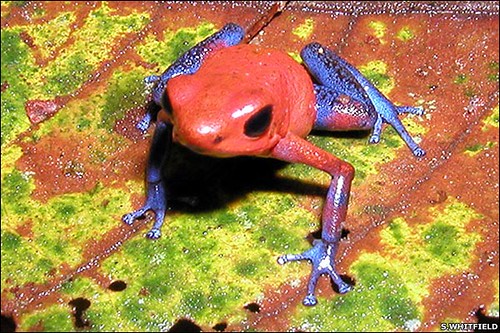The strawberry poison frog, Oophaga pumilio, is one of the species of amphibians and reptiles declining in the lowland forests of Costa Rica.
Image source: BBC News.
The recent decline in frogs and other amphibians has been blamed on a deadly fungus, Batrachochytrium dendrobatidis. However, a paper was published this week that proposes another reason for the decline of frogs: there is less leaf litter on the forest floor than in years past.
This study, carried out in a Costa Rican rainforest, found that lizards, which are not susceptible to this fungus, are also decreasing by a similar rate to frogs. It is possible that these declines are due to the loss of critical habitat for amphibians and lizards is provided by leaf litter. The reduction in leaf litter is thought to be tied to global warming.
"The increasingly warm and wet conditions of the past two decades could negatively influence standing litter mass by affecting rates of litterfall or litter decomposition," the authors wrote in their paper.
Dr Paul Pearce-Kelly, a senior curator at the Zoological Society of London, said the findings made an important contribution towards understanding what was behind the decline of the world's frog population.
"This is a very interesting set of work that points out the complicated nature of species decline," he said.
"We shouldn't forget that any kind of change affecting one species can leave it weakened and predeposed to being more vulnerable to disease and other impacts.
"The environment, regardless of whether it is a protected forest system or not, is highly vulnerable to temperature changes."
The study appears in Proceedings of the National Academy of Sciences (PNAS).
Cited story.
.
- Log in to post comments


Not cell phones?
Thanks for the heads up on this PNAS paper--I think this is an important paper for a couple of reasons. First, it's a piece in the puzzle of amphibian declines that nobody has looked at before (to my knowledge, anyway). Second, they also show that lizards have been adversely affected. Almost all the herp-related studies so far have looked at how amphibians are impacted by climate change--very few have looked at the effects on reptiles.
Thanks also for the heads up on the recent PNAS paper on the fossil gliding lizard!
Dang, so that's where the frogs all go in winter! I was told that they hibernated, but actually they all go on holiday to the forests of Costa Rica.
More seriously, I'm sceptical about links of this to global declines, which is what the BBC report implies (haven't read PNAS yet: my guess is that they don't frame the problem in such a cavalier fashion).
Bob
Bob; you're probably right. so when you get the PDF of the PNAS paper, please send me a copy so i can write about it here.